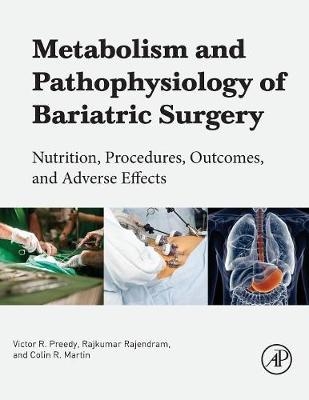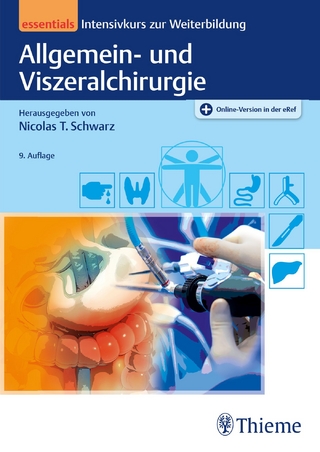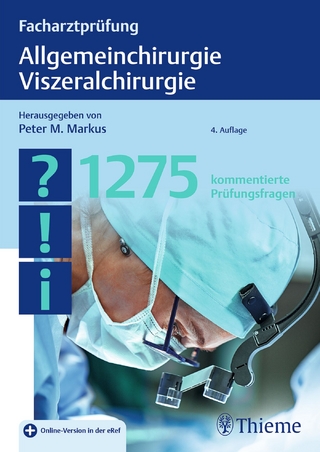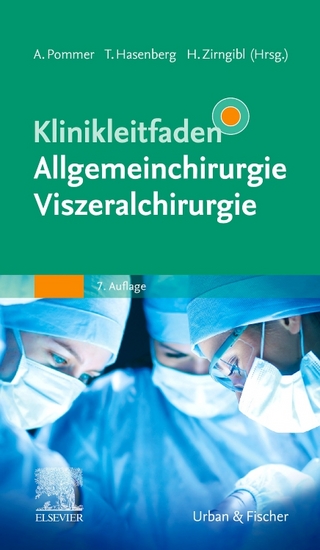
Metabolism and Pathophysiology of Bariatric Surgery
Academic Press Inc (Verlag)
978-0-12-804011-9 (ISBN)
Victor R. Preedy BSc, PhD, DSc, FRSB, FRSPH, FRSC, FRCPath graduated with an Honours Degree in Biology and Physiology with Pharmacology. After gaining his University of London PhD, he received his Membership of the Royal College of Pathologists. He was later awarded his second doctorate (DSc), for his contribution to protein metabolism in health and disease. He is Professor of Clinical Biochemistry (Hon) at King’s College Hospital and Emeritus Professor of Nutritional Biochemistry at King’s College London. He has Honorary Professorships at the University of Hull, and the University of Suffolk. Professor Preedy was the Founding Director and then long-term Director of the Genomics Centre at King’s College London from 2006 to 2020. Professor Preedy has been awarded fellowships of the Royal Society of Biology, the Royal College of Pathologists, the Royal Society for the Promotion of Health, the Royal Institute of Public Health, the Royal Society for Public Health, the Royal Society of Chemistry and the Royal Society of Medicine. He carried out research when attached to the National Heart Hospital (part of Imperial College London), The School of Pharmacy (now part of University College London) and the MRC Centre at Northwick Park Hospital. He has collaborated with international research groups in Finland, Japan, Australia, USA, and Germany. To his credit, Professor Preedy has published over 750 articles, which includes peer-reviewed manuscripts based on original research, abstracts and symposium presentations, reviews and edited books. Dr Rajkumar Rajendram is a clinician scientist with a focus on internal medicine, anaesthesia, intensive care and peri-operative medicine. He graduated with distinctions from Guy’s, King’s and St. Thomas Medical School, King’s College London in 2001. As an undergraduate he was awarded several prizes, merits and distinctions in pre-clinical and clinical subjects. Dr Rajendram began his post-graduate medical training in general medicine and intensive care in Oxford. He attained membership of the Royal College of Physicians (MRCP) in 2004 and completed specialist training in acute and general medicine in Oxford in 2010. Dr Rajendram subsequently practiced as a Consultant in Acute General Medicine at the John Radcliffe Hospital, Oxford. Dr Rajendram also trained in anaesthesia and intensive care in London and was awarded a fellowship of the Royal College of Anaesthetists (FRCA) in 2009. He completed advanced training in regional anaesthesia and intensive care. He was awarded a fellowship of the Faculty of Intensive Care Medicine (FFICM) in 2013 and obtained the European diploma of intensive care medicine (EDIC) in 2014. He then moved to the Royal Free London Hospitals as a Consultant in Intensive Care, Anaesthesia and Peri-operative Medicine. He has been a fellow of the Royal College of Physicians of Edinburgh (FRCP Edin) and the Royal College of Physicians of London (FRCP Lond) since 2017 and 2019 respectively. He is currently a Consultant in Internal Medicine at King Abdulaziz Medical City, National Guard Heath Affairs, Riyadh, Saudi Arabia. Dr Rajendram’s focus on improving outcomes from Coronavirus Disease 2019 (COVID-19) has involved research on point of care ultrasound and phenotypes of COVID-19. Dr Rajendram also recognises that nutritional support is a fundamental aspect of medical care. This is particularly important for patients with COVID-19. As a clinician scientist he has therefore devoted significant time and effort into nutritional science research and education. He is an affiliated member of the Nutritional Sciences Research Division of King’s College London and has published over 400 textbook chapters, review articles, peer-reviewed papers and abstracts. Colin R. Martin RN, BSc, MSc, PhD, MBA, YCAP, FHEA, C.Psychol, AFBPsS, C.Sci is Professor of Clinical Psychobiology and Applied Psychoneuroimmunology and Clinical Director of the Institute of Health and Wellbeing at the University of Suffolk, UK. He is a Chartered Health Psychologist and a Chartered Scientist. He also trained in analytical biochemistry, this aspect reflecting the psychobiological focus of much of his research within mental health. He has published or has in press well over 300 research papers and book chapters. He is a keen book author and editor having written and/or edited more than 50 books. These outputs include the prophetic insight into the treatment of neurological disease, Handbook of Behavior, Food and Nutrition (2011), Nanomedicine and the Nervous System (2012), Oxidative Stress and Dietary Antioxidants in Neurological Disease (2020), Zika Virus Impact, Diagnosis, Control and Models (2021), Factors Affecting Neurodevelopment: Genetics, Neurology, Behavior and Diet (2021), Diagnosis and Treatment of Spinal Cord Injury (2022), The Neurobiology, Physiology, and Psychology of Pain (2022) and The Handbook of Lifespan Cognitive Behavioral Therapy: Childhood, Adolescence, Pregnancy, Adulthood, and Aging (2023). Professor Martin is particularly interested in all aspects of the relationship between underlying physiological substrates and behavior, particularly in how these relationships manifest in both acute and chronic psychiatric disorder. He has published original research germane to significant mental health disorders including the areas of schizophrenia, anxiety, depression, self-esteem, alcohol and drug dependency, high secure forensic mental health and personality disorder. He has a keen interest in the impact of postviral illness and is actively involved in clinical research post-Covid pandemic and in particular, the impact of Long Covid on psychological, neurological, physiological and social functioning. He is involved in collaborative International research with many European and Non-European countries.
Section I: Features of Obesity and Strategies for Weight Loss1. Obesity and Cardiac Failure: Pathophysiology, Epidemiology, Clinical Manifestations, and Management2. Obesity and Adipose Tissue Microvascular Dysfunction3. Ghrelin-Producing Cells in Stomachs: Implications for Weight Reduction Surgery4. Asthma in Obesity and Diabetes: Novel Mechanisms and Effects of Bariatric Surgery5. Percutaneous Electrical Neurostimulation of Dermatome T6 to Reduce Appetite6. The Management of Obesity: An Overview
Section II: Surgical and Postsurgical Procedures7. Why Patients Select Weight Loss Bariatric Surgery8. Best Practices for Bariatric Procedures in an Accredited Surgical Center9. Anesthesia for Bariatric Surgery10. Laparoscopic Roux-en-Y Gastric Bypass11. Omega Loop Gastric Bypass12. Laparoscopic Sleeve Gastrectomy13. Laparoscopic Adjustable Gastric Banding14. Biliopancreatic Diversion15. Endoluminal Procedures for the Treatment and Management of Bariatric Patients16. Intragastric Balloon for the Treatment of Morbid Obesity17. Jejunoileal Bypass: Physiologic Ramifications of an Obsolete Procedure That Has Resurfaced in Oncologic Surgery18. Pediatric Bariatric Surgery19. Pregnancy After Bariatric Surgery20. Mortality Rate and Long-Term Outcomes After Bariatric Surgery21. Critical Care After Bariatric Surgery
Section III: Safety and Outcomes22. An Overview of the Safety of Bariatric Surgery23. Safety of Bariatric Surgery in Adolescents24. Mortality in Bariatric Surgery: A Focus on Prediction25. Comparing Weight Loss in Three Bariatric Procedures: Roux-en-Y Gastric Bypass, Vertical Banded Gastroplasty, and Gastric Banding26. Metabolic Predictors of Weight Loss After Bariatric Surgery27. Long-Term Weight Loss Results After Laparoscopic Sleeve Gastrectomy28. Gastric Band Slippage as an Adverse Event29. Leaks and Fistulas After Bariatric Surgery30. Gastric Leaks and Use of Endoscopic Internal Drainage With Enteral Nutrition31. Gastroesophageal Reflux Disease and Hiatal Hernia in Bariatric Procedures
Section IV: Metabolism, Endocrinology and Organ Systems32. Endoscopic Treatments for Obesity-Related Metabolic Diseases33. Sleeve Gastrectomy: Mechanisms of Weight Loss and Diabetes Improvements34. Postprandial Hyperinsulinemic Hypoglycemia in Bariatric Surgery35. Bariatric Surgery Improves Type 2 Diabetes Mellitus36. Weight Loss Surgery and the Surrogate Insulin Resistance Markers HOMA, TyG, and TG/HDL-c in Relation to Metabolic Syndrome37. Cancer and Bariatric Surgery38. Upper Gastrointestinal Diseases Before and After Bariatric Surgery39. Hematological Disorders Following Bariatric Surgery40. Enteric Hyperoxaluria, Calcium Oxalate Nephrolithiasis, and Oxalate Nephropathy After Roux-en-Y Gastric Bypass41. Thyroid Hormone Homeostasis in Weight Loss and Implications for Bariatric Surgery42. The Ghrelin–Cannabinoid 1 Receptor Axis After Sleeve Gastrectomy43. PNPLA3 Variant p.I148M and Bariatric Surgery
Section V: Nutritional Aspects44. Dietary Reference Values45. Meal Disposal After Bariatric Surgery46. Underreporting of Energy Intake and Bariatric Surgery47. Control Eating Following Bariatric Surgery48. Dietary Planning in Bariatric Surgery Postoperative49. Protein Nutrition and Status and Bariatric Surgery50. Micronutrient Deficiencies and Sleeve Gastrectomy for Weight Reduction51. Thiamine (Vitamin B1) After Weight Loss Bariatric Surgery52. Vitamin A and Roux-EN-Y Gastric Bypass53. Iron and Bariatric Surgery
Section VI: Cardiovascular, Body Composition, and Physiological Aspects54. Long-Term Cardiovascular Risks in Bariatric Surgery55. QT Interval After Bariatric Surgery56. Plasma Polyunsaturated Fatty Acids After Weight Loss Surgery57. Bariatric Procedures and Dual Energy X-Ray Absorptiometry58. Factors Associated with Metabolic Bone Disorders and Its Complications After Bariatric Surgery59. Gait Patterns After Bariatric Surgery
Section VII: Psychological and Behavioral Aspects60. Preoperative Psychosocial Assessment for the Bariatric Patient61. Neurocognitive Factors Associated With Obesity, Obesity-Related Disorders, and Bariatric Surgery62. Temperament and Outcome of Bariatric Surgery for Severe Obesity63. Cognitive Behavioral Therapy for Bariatric Surgery Patients64. Does Body Dysmorphic Disorder Have Implications for Bariatric Surgery?65. Issues Surrounding the Relationship Between Sexual Function and Bariatric Surgery66. Depression and Intragastric Balloon Treatment
Section VIII: Resources67. Recommended Resources on Metabolism and Physiology of Bariatric Surgery
| Erscheinungsdatum | 27.12.2016 |
|---|---|
| Verlagsort | San Diego |
| Sprache | englisch |
| Maße | 216 x 276 mm |
| Gewicht | 1790 g |
| Themenwelt | Medizinische Fachgebiete ► Chirurgie ► Viszeralchirurgie |
| Studium ► 2. Studienabschnitt (Klinik) ► Pathologie | |
| ISBN-10 | 0-12-804011-4 / 0128040114 |
| ISBN-13 | 978-0-12-804011-9 / 9780128040119 |
| Zustand | Neuware |
| Haben Sie eine Frage zum Produkt? |
aus dem Bereich


